|
|
|
Sort Order |
|
|
|
Items / Page
|
|
|
|
|
|
|
| Srl | Item |
| 1 |
ID:
118170
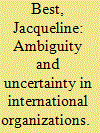

|
|
|
|
|
| Publication |
2012.
|
| Summary/Abstract |
How do international organizations deal with the persistent challenge of uncertainty? The most intuitive answer is through regulation. Yet, rules are not always the best solution in times of uncertainty or in dealing with complex and diverse problems. More ambiguous policies that leave room for interpretation, can often be more functional for an international organization (IO); moreover, ambiguities can also be a source of power-and are therefore often a subject of conflict among institutional actors. Focusing on the case of International Monetary Fund conditionality policy, this article provides several key insights into IO practices. It provides an account of the different forms that ambiguity can take in international organizations and develops an explanation for why institutional ambiguities appear and persist. Looking inside the IO black box, the study examines how interests, institutional culture, and legitimacy concerns shape actors' support for ambiguity, and how these preferences combine with broader structural factors to produce a predisposition toward institutional ambiguity. Finally, this article points toward certain implications of organizations' tendency toward ambiguity, suggesting that this may play an important role in enabling institutional expansion.
|
|
|
|
|
|
|
|
|
|
|
|
|
|
|
|
| 2 |
ID:
118168
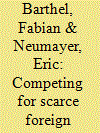

|
|
|
|
|
| Publication |
2012.
|
| Summary/Abstract |
Recent research suggests that double taxation treaties (DTTs) increase bilateral foreign direct investment (FDI). However, entering such a tax treaty is not unambiguously favorable for both partners if their bilateral FDI positions are asymmetric. Due to the usual bias toward residence-based taxation in DTTs, net capital importers can face a considerable loss of tax revenues when entering these treaties. Nevertheless, there is an ever denser and growing global network of such treaties. This article argues that net capital-importing countries are caught in a prisoners' dilemma: Collectively, they would be better off refusing to sign DTTs, but each one has an incentive to sign DTTs to gain a competitive advantage. Countries will look toward and be influenced by the policy choices of other focal countries and will follow their DTT activity. We find evidence for such spatial dependence in our analysis of DTT diffusion in a global sample over the period 1969-2005. Dyads are more likely to sign a DTT the more DTTs have previously been concluded by the regional peers of the dyad members as well as by other countries who compete with at least one of the dyad members in terms of export product structure.
|
|
|
|
|
|
|
|
|
|
|
|
|
|
|
|
| 3 |
ID:
118181
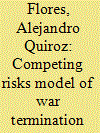

|
|
|
|
|
| Publication |
2012.
|
| Summary/Abstract |
Recent research suggesting that leader transitions increase the probability of war termination is based on the assumption that leader change is exogenous. However, the exogeneity of leader change needs to be tested, not assumed. This paper uses a bivariate discrete survival model to test the exogeneity of leader change and correctly estimate its partial effect on war termination. The paper extends the analysis by estimating a competing risks model of types of leader transitions. The evidence shows that leader change in large coalition systems never increases the probability of war termination, while leader change in small coalition systems never reduces the probability of war termination. In short, leader transitions in autocratic systems are more likely to bring interstate war to an end than leader transitions in democratic ones. The study also shows that the marginal effect of leader change fades away as the war progresses, and that war has negative duration-dependence.
|
|
|
|
|
|
|
|
|
|
|
|
|
|
|
|
| 4 |
ID:
118180


|
|
|
|
|
| Publication |
2012.
|
| Summary/Abstract |
Why do some states emerging from civil war take significant strides toward democracy while others do not? The existing literature comes to contradictory and puzzling findings, many of which, we argue, are driven by methodological problems. We examine the determinants of democratization in the short, medium, and long term after civil wars ending between 1945 and 1999. Other than a short-term effect of negotiated settlements, we find little support for the prominent claim that the outcome of the war shapes the prospects for postwar democratization. Neither does peacekeeping foster democratization. Meanwhile, consistent with the more general democratization literature, we find that economic development aids democratization while oil wealth hinders it. In short, we find the determinants of democratization to be much the same for post-civil war societies as for other societies.
|
|
|
|
|
|
|
|
|
|
|
|
|
|
|
|
| 5 |
ID:
118182


|
|
|
|
|
| Publication |
2012.
|
| Summary/Abstract |
This article builds off of previous work by Rogowski and Kayser (2002) and Chang, Kayser, and Rogowski (2008) in order to determine the effects of democracy styles on trade policy preferences. This work uses the common Stigler-Peltzman Framework of regulation and finds a bias that favors consumers in majoritarian systems and favors producers in proportional representation systems. Their measurement of bias leaves many gaps in the interpretation of their results, a problem that is remedied by using a more direct measurement of bias. This article uses a single policy, agriculture, in order to determine whether this evidence of consumer bias holds. While the results are largely in line with the previous work, the modeling style and the dependent variable of choice strengthens the results and the connection to the theoretical framework of Stigler and Peltzman.
|
|
|
|
|
|
|
|
|
|
|
|
|
|
|
|
| 6 |
ID:
118176
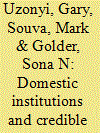

|
|
|
|
|
| Publication |
2012.
|
| Summary/Abstract |
Audience costs are a central feature of many prominent theories of international conflict. We advance the understanding of audience costs by specifying the domestic institutions necessary to generate them. In our conceptualization, audience cost capacity (ACC) is a function of the availability of alternative rulers and the cost of mobilizing against the incumbent. This conceptualization leads to the first measure of ACC that has variation between more and less democratic political systems and variation within autocracies. We subject our measure to a rigorous set of tests that includes addressing selection effects and temporal treatment effects, neither of which have been fully examined in this research area. The empirical analysis offers strong support for the validity of our measure.
|
|
|
|
|
|
|
|
|
|
|
|
|
|
|
|
| 7 |
ID:
118183
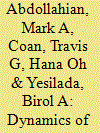

|
|
|
|
|
| Publication |
2012.
|
| Summary/Abstract |
The relationship between economic development, cultural change, and political liberalization is often explored through the lens of classic modernization theory. Recent scholarship attempts to extend classic theory to be more closely aligned with empirical reality. Under the human development perspective, economic prosperity acts as a catalyst for cultural development, leading to social values that favor liberalization, and thus promotes effective democracy. Using a systems dynamic approach, we formalize the dynamic causal structure specified in the human development perspective, develop a novel econometric procedure (Genetic Algorithm Nonlinear Least Squares) to estimate the parameters of highly nonlinear, continuous time models, and verify our formal model using five waves of data from the World Values Survey. Our results indicate that development is strongly nonlinear and path dependent: Economic progress is a necessary condition for successful secularization and expressive political behavior, which are antecedents for lasting democratic institutions. Thus, policies and institutional arrangements must be tailored to, not outpace, a nation's level of economic progress to create demand for a secular and expressive political marketplace where democratic institutions can sustain and thrive.
|
|
|
|
|
|
|
|
|
|
|
|
|
|
|
|
| 8 |
ID:
118184


|
|
|
|
|
| Publication |
2012.
|
| Summary/Abstract |
The rise of China has led to a spate of scholarly and journalistic speculation about the future of a liberal world order. Apparently, the rise of a nondemocratic, Asian rival to US hegemony potentially undermines the growth of democracy throughout the system. Many see a resource-hungry China engaging itself globally out of purely self-interested motives, and Chinese business and aid offer a viable alternative to Western influence. Using the Stockholm Institute for Peace Research's (SIPRI) data on arms transfers since the end of the Cold War, we test the proposition empirically by assessing the nature and strength of Chinese politico-military support, measured as conventional arms transfers, globally and to African regimes. In short, we find that China relative to the United States transfers greater amounts of arms to democracies rather than autocracies, whereas the United States seems to prefer more autocratic regimes, despite rhetoric that claims an ethical foreign policy. The same result holds when we assess this relationship using human rights data. Moreover, Chinese arms transfers to countries suffering civil wars are much lower than the United States'. The findings are robust to the inclusion of several control variables and alternative estimation techniques. The findings show that popular perceptions about China's role in Africa do not match reality, particularly when assessed against the current hegemon's behavior.
|
|
|
|
|
|
|
|
|
|
|
|
|
|
|
|
| 9 |
ID:
118172


|
|
|
|
|
| Publication |
2012.
|
| Summary/Abstract |
Do fair trade PTAs-trade agreements that contain provisions for protection of labor rights-lead to improvements in labor protection in PTA partner states? If so, how do the PTAs bring about such improvements? I argue that trade partner states are likely to engage in ex ante due diligence and improve the protection of labor rights at home before they sign or even enter into negotiations for a PTA. Given that large developed economies have increasingly placed value on strong labor protection, trade partners of these economies act on the belief that, holding other factors constant, having stronger labor protection will increase their attractiveness as a potential or a prospective PTA partner. I test this argument in the context of the United States and its trade partners between 1982 and 2005. The evidence shows that trade partner states indeed are much more likely to improve labor protection (i) prior to the 2002 Trade Act publicizing the importance of labor protection and (ii) prior to signing a PTA with the United States.
|
|
|
|
|
|
|
|
|
|
|
|
|
|
|
|
| 10 |
ID:
118174


|
|
|
|
|
| Publication |
2012.
|
| Summary/Abstract |
Olson hypothesized that a latent group's ability to organize and contribute toward providing a public good might be jeopardized by free riding. The politics of trade protection feature the collective action problem, since protection benefits all firms in the industry including those who contributed nothing to attaining it. This paper examines the extent of free riding in lobbying over tariffs in the context of the Grossman and Helpman (1994) protection-for-sale model in which industry lobbies seek to bend government policy in their favor. Previous investigations of the model have produced the puzzling result that governments are largely welfare-maximizing and care little about campaign contributions, in contrast to numerous examples of welfare-reducing policies that have in fact been bought cheaply by special interests. We think the result arises because the model assumes away free riding by firms which hinders industry's ability to organize politically. We introduce free riding into the Grossman-Helpman model, allowing industries to be partially organized. Using a new data set on US trade barriers, we test the model using estimation methods new to this literature. The estimates support the model's predictions and reveal that the extent of free riding by manufacturing firms can help resolve the puzzling result.
|
|
|
|
|
|
|
|
|
|
|
|
|
|
|
|
| 11 |
ID:
118178
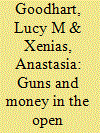

|
|
|
|
|
| Publication |
2012.
|
| Summary/Abstract |
Can monetary policy, and the exchange rate, affect military capability? If weapons systems are purchased on international markets, then a depreciating currency can reduce the import of arms, affecting the relative capabilities of military rivals. In this research note, we analyze the demand for arms imports using an error correction model. We show that arms are a "normal" good, with the quantity demanded directly related to price and with exchange rates serving as an instrument for price movements that are normally unobserved. Such price movements are increasingly important given currency volatility and a reliance on imported technology.
|
|
|
|
|
|
|
|
|
|
|
|
|
|
|
|
| 12 |
ID:
118171
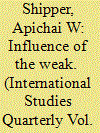

|
|
|
|
|
| Publication |
2012.
|
| Summary/Abstract |
Political life in modern Japan, South Korea, and Taiwan is commonly characterized by a strong central government, influential economic elites, and a relatively homogeneous society. In such settings, we would not expect to find much impact by foreigners and small NGO actors on policy changes, but the cases in these countries challenge this assessment. Relatively unskilled foreign workers in present-day Northeast Asia face a range of hardships, and existing government programs have provided little support until recently. Media portrayals of foreign workers-as in several other industrialized democracies-reinforce popular suspicions and fear of these foreigners. Yet, citizens of host countries themselves have formed numerous voluntary associations aimed at assisting foreign workers. I call the activities of these groups "associative activism." My account of associative activism makes explicit the process through which some activists, who initially work in concert chiefly to solve specific problems, eventually form broader political ambitions as they exert pressure on dominant features of the public sphere, especially processes of governance, political representation, and opinion formation. I identify three domains of associative activism through which political influence is exerted by immigrant rights groups: legislative, juridical, and municipal. These efforts illustrate how civil society groups can play an increasing role in protecting foreigners' rights and advancing democratization in Northeast Asia.
|
|
|
|
|
|
|
|
|
|
|
|
|
|
|
|
| 13 |
ID:
118175
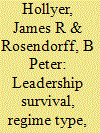

|
|
|
|
|
| Publication |
2012.
|
| Summary/Abstract |
Preferential trade agreements (PTAs) limit member-states' trade policy discretion; consequently, policy uncertainty is mitigated. Reductions in policy uncertainty stemming from accession to a PTA improve the resource allocation decisions of the voters and reduce deadweight losses from the need to self-insure against policy uncertainty. The resultant increase in efficiency improves an incumbent government's-particularly a democratic government's-chance of surviving in office. We test this prediction using survival analysis, adjusting for potential selection biases using propensity score matching. We find robust support for the proposition that governments that sign PTAs survive longer in office than observationally similar governments that do not sign. In addition, we find that this effect is stronger in democracies than in autocracies.
|
|
|
|
|
|
|
|
|
|
|
|
|
|
|
|
| 14 |
ID:
118177
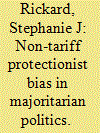

|
|
|
|
|
| Publication |
2012.
|
| Summary/Abstract |
Governments elected by majoritarian rules are, according to conventional wisdom, more protectionist than governments elected by proportional rules. However, existing tests of this claim examine only one possible form of trade protection: tariffs. This leaves open the possibility that governments in majoritarian systems provide no more protection than governments in proportional systems but simply use tariffs more often than other forms of trade protection. Does the protectionist bias in majoritarian politics extend beyond tariffs? The current study addresses this question by examining an increasingly important form of trade protection: subsidies. In a sample of 68 countries from 1990 to 2006, spending on subsidies is found to be higher in majoritarian systems than in proportional systems, holding all else equal. The implication is that the protectionist bias in majoritarian systems does in fact extend beyond tariffs.
|
|
|
|
|
|
|
|
|
|
|
|
|
|
|
|
| 15 |
ID:
118167
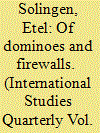

|
|
|
|
|
| Publication |
2012.
|
| Summary/Abstract |
The Great Recession, Euro contagion, Middle East upheavals, nuclear proliferation, and expansion of rights, among others, highlight the centrality of diffusion to international studies. This Presidential Address outlines building blocks for a shared conceptualization of diffusion that is attentive to the initial stimulus; the medium through which information about the stimuli may/may not travel to other destinations; the political agents un/affected by the stimulus' positive or negative externalities, who aid or block the stimulus' journey to other destinations; and outcomes that enable discrimination among grades of diffusion and resulting equilibria. Various issue areas illustrate how initial stimuli may/may not change preferences, transform identities, trigger emotions, alter strategic choices, and affect outcomes. I advance three related considerations. First, to avoid selection bias, understanding what does not diffuse (the "Vegas counterfactual") should be as central as what does. Concepts such as firewalls and sedimentation are essential for gauging a medium's relative immunity/vulnerability to diffusion. Second, weaving domestic, regional, and global considerations into a single analytical framework reduces omitted variable bias and enables systematic cross-regional comparisons. Third, these building blocks imbue the study of diffusion with political dynamics-entailing strategic interaction, contingency, incomplete information, and unintended effects-that defy determinism, automaticity, or teleology. Similar causal mechanisms may yield different outcomes under different domestic, regional, and global conditions. And different mechanisms may yield similar outcomes under comparable circumstances. I highlight the challenges inherent in assessing the outcomes of diffusion given competing empirical findings, epistemologies, and normative readings of what does/does not and should/should not diffuse, and outline an agenda for future research.
|
|
|
|
|
|
|
|
|
|
|
|
|
|
|
|
| 16 |
ID:
118169
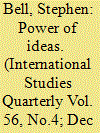

|
|
|
|
|
| Publication |
2012.
|
| Summary/Abstract |
It is now widely accepted that the classic arguments regarding the "structural power" of business are too "structuralist." Subsequent research has focused on a widening array of independent variables that shape the variability of such power. This paper extends this research tradition, arguing that structural power theory has given insufficient attention to governmental actors, typically the targets of such power. The paper argues that ideas and the ideational processes through which government and state leaders construct threat perceptions regarding structural power can be important in mediating such power. The literature on power typically argues that power shapes ideas and disciplines target subjects. This paper revises this logic by arguing that the ideas of target subjects can also shape power. The paper's arguments then are essentially constructivist, but the paper extends such arguments by insisting on a greater role for agency than is often found in constructivist reasoning.
|
|
|
|
|
|
|
|
|
|
|
|
|
|
|
|
| 17 |
ID:
118173
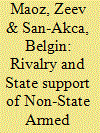

|
|
|
|
|
| Publication |
2012.
|
| Summary/Abstract |
This study examines the conditions under which states engaged in strategic rivalries choose to support Non-state Armed Groups (NAGs) that target their rivals. NAGs include ethnic or religious insurgents, guerilla organizations, and terrorists. We develop a rational choice model of state support for NAGs. We focus on state support of NAGs as cooperation between states and NAGs emerging out of a mutual and purposive decision-making process. The model suggests that decisions of states to support NAGs targeting a rival are affected by dissatisfaction with the status quo and the expected risk of retaliation. Rivalries create opportunities for NAGs that operate against one of the rivals, allowing them to acquire resources to sustain their operations. The presence of rivalry increases the likelihood of state-NAG cooperation. In turn, state-NAG cooperation increases the likelihood of rivalry escalation. We test the propositions of the model using an original data set that includes observations for 175 NAGs and 83 state supporters in the post-WWII period. We find consistent support for our propositions. We discuss the implications of these results for the theory and practice of international relations.
|
|
|
|
|
|
|
|
|
|
|
|
|
|
|
|
| 18 |
ID:
118179
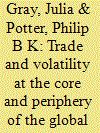

|
|
|
|
|
| Publication |
2012.
|
| Summary/Abstract |
Researchers typically assume that economic openness increases volatility. But the conventional empirical shorthand for economic openness (trade as a share of overall income) fails to account for crucial distinctions in the way that states trade. States that are deeply incorporated into the core of the international trading network have very different experiences than states at the periphery with fewer, more marginalized trading partners. This article demonstrates that a position at the core of the international trading system rather than the periphery actually diminishes volatility. Thus, a country's position in the world economy can, independently of its overall volume of trade, moderate the risks of exposure to international markets. To demonstrate how this distinction might impact political outcomes and future scholarship, we show that this reduction in volatility allows governments to minimize compensation to their domestic publics.
|
|
|
|
|
|
|
|
|
|
|
|
|
|
|
|
|
|
|
|
|